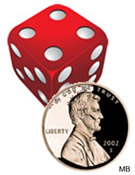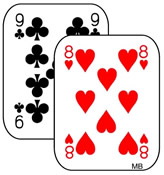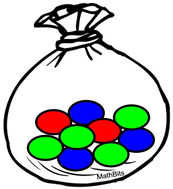|
When working with compound events, the probability of the events occurring at the same time can be found using "the Multiplication Rule for Probability."
The Multiplication Rule of Probability is used to find
the probability that event A and event B both occur one after the other.
We will be using this rule only with independent events,
where one event does not affect the other. |
|

 |
. |
A die is rolled and a penny is tossed. What is the probability that a 3 is rolled on the die and a head is tossed on the penny? |
Solution:
Sample space (die) = {1, 2, 3, 4, 5, 6}
Event A: Rolling a 3 on a die: P(A) = 1/6
Sample space (penny)= {H, T}
Event B: Tossing a head with the penny: P(B) = 1/2
Probability of BOTH: These are independent events. Event A does not have an effect on event B.
Answer: P(A and B) = P(A) • P(B) = 1/6 • 1/2 = 1/12 |
 |
 |
. |
Two cards are drawn from a standard deck of cards. What is the probability that the first card is a club and the second card is a heart?
The first card is replaced in the deck before the second card is drawn. |
Solution:
Sample space = {52 cards in the deck}
Event A: Drawing a club: {13 clubs} P(A) = 13/52 = 1/4
Sample space = {52 cards since the first card was replaced}
Event B: Drawing a heart: {13 hearts} P(B) = 13/52 = 1/4
Probability of BOTH: These are independent events. Event B is not affected by event A. By replacing the card, the sample space for the second draw is the same as that for the first draw..
Answer: P(A and B) = P(A) • P(B) = 13/52 • 13/52 = 169/2704
|
 Independent events since the first card was replaced.
Independent events since the first card was replaced. |
 |
. |
A sack contains 4 green marbles, 3 blue marbles and 2 red marbles. What is the probability of drawing two green marbles in a row if the first marble is returned to the sack before the second draw? |
Solution:
Sample space = {9 marbles}
Event A: Drawing a green marble: P(A) = 4/9
Sample space = {9 marbles}
Event B: Drawing a green marble: P(B) = 4/9
Probability of BOTH: These are independent events. Event B is not affected by event A since the first marble is replaced.
Answer: P(A and B) = P(A) • P(B) = 4/9 • 4/9 = 16/81
|
 Independent events since the first marble was replaced.
Independent events since the first marble was replaced. |

NOTE: The re-posting of materials (in part or whole) from this site to the Internet
is copyright violation
and is not considered "fair use" for educators. Please read the "Terms of Use". |
|
|